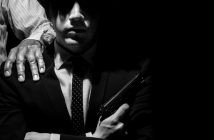This isn’t about Elliot Rodger.
Nor is it about the horrific events that occurred last week, nor the fear I have for a culture, our own, which not only struggles in the aftermath of violence toward women but sometimes seems to openly foster such violence.
This is about the uproar I’ve watched unfold across the internet this week in response to a poem that word-for-word employs and rearranges— yes, remixes— the language of Elliot Rodger’s video, and which has received scorn, it seems, from almost everywhere. This is about the hazardous trend in contemporary poetry toward impulsive responses, reactions grounded in the pretense of leftism that in fact funnel themselves into a quite conservative position in regard to art and culture.
without engaging on any kind of aesthetic or literary level the reason— and such reasons exist— the poem should be called “bad.” Likewise, Facebook and Twitter have reverberated this week— at least if my own feeds are any indication—with poets denouncing Abramson’s poem as “offensive” without commentary on how and why it is so. This is an irresponsible treatment of art. This is what happens when the careful attention a poem demands is replaced by hashtags, and when social commitment and meaningful engagement gives way to lazy, knee-jerk internet responses. More than Abramson’s poem itself, the large-scale and hasty reaction to the poem—without significant, intelligent engagement with what is wrong with it, and more importantly without a discussion of how we can successfully engage with tragedy—makes me fearful that poetry will cease to engage with tragedy at all.
One word that has appeared over and over in the reaction to Abramson’s poem is “misogynist,” but, like with Diamond’s labeling of the poem as “bad poetry,” I’ve yet to read someone explain how his poem is misogynistic. The quick pasting-on of labels—calling poems or, more disturbingly, poets misogynist or racist or sexist or classist—without an intellectual discussion of these categories points to a growing problem in the poetry world today: the embracing of quick, politically correct public statements and the dismissal of art that takes risks and that challenges the canon of what we deem acceptable to write about. There’s no question that a vigorous conversation needs to happen about Abramson’s poem, but we need to be careful that views couching themselves as leftism or feminism don’t eerily plummet into a conservative, censorious realm. This kind of conversation serves no one. If what Abramson wrote isn’t successful—which I’d love to read a careful discussion of why it isn’t—then let’s talk about how it could be.
Somewhat ironically, the hurried response to Abramson’s poem ended up resembling the kind of publicity grabbing of which Abramson himself has been accused. No doubt Flavorwire and poets posting various online denunciations have benefited from the controversy surrounding “The Last Words….” But I’ve yet to see these poets or Flavorwire—which interestingly tagged Diamond’s post as “upworthy”—called out for performing the same rash response. And since when did the important discussion of art revolve around its impetus? When all that is left is the poem, or the painting, or the sculpture, aren’t we meant to engage meaningfully with what is left—with the art in itself?
The concern with the timing of Abramson’s poem has turned toward a discussion—if one could call it that—of who is and is not in a position to respond publicly to tragedy, of who has been given—or who has taken—the authority to do so. This is no small concern. But, upon reading urgings for Abramson to “sit down and listen” I began to feel a bit queasy. Would a woman be condemned, as Abramson was, to sit in silence in the face of tragedy? Might not our censorship of art based upon demographics be just as irresponsible as the art our censorship condemns?
Yet it’s not only demographics that lie behind the condemnation of Abramson, but also, I think, the reputation of Abramson himself. I don’t know Seth Abramson, but I do know, in my limited interactions with the poetry world, that he’s someone people love to hate. I’m willing to accept, as a poet and as a woman, a denunciation of “The Last Words…” that comes from our deep care for language and for poetry, but I’m not willing to accept a critique of the poem based on resentment toward the poet himself.
—a project that champions the work of other writers, not his own—is a disturbing repercussion for a risk that could be seen as bad taste, and one I can’t help but see stemming from fear of the public eye, of how others view Abramson (*correction). It’s deeply troubling that so many writers have lauded Omnidawn’s action, that they’ve chosen to condemn a fellow writer for taking an artistic risk, particularly given Omnidawn’s failure to explain why and how Abramson’s poem is problematic. We need risk-taking, potentially upsetting figures like Seth Abramson, just as we need Patricia Lockwood and Tony Hoagland and Michael Robbins.
I’ve always believed that poets are the caretakers of language. But that doesn’t mean we should make language precious. In fact, that’s the worst thing we can do. If we are indeed caretakers, I hope we are so in the sense of tearing walls down, not bolstering them; protecting certain subjects and language does poetry a disservice. If, though, we must say there are taboo subjects and stances in poetry, why not take them as an opportunity to say something important about art, instead of engaging in reckless internet slander? It’s easy to say what poetry can’t do, but what about opening up the conversation to how poetry can accomplish these difficult maneuvers?
I’ve been disheartened this week by the discussion of who has license to respond to tragedy, in what capacity, and when. As writers, we will always be using the language of murderers. As writers, we will always be attempting to use it in the service of art, and, inevitably, at times, failing. In the wake of that failure, great art is born. Gregory Orr has said that he believes in poetry “as a way of surviving the emotional chaos, spiritual confusions and traumatic events that come with being alive.” Let’s stop ridiculing someone who is attempting this kind of survival. Let’s be good caretakers of language, and foster it, not stifle it. Let’s be democratic as an audience, not in taste, but in compassion for our fellow artists, artists who are taking risks, as I hope the rest of us are doing as well. Let’s have conversations, instead of hashtags, about what art can do.
Because art can do anything.
*Correction: Omnidawn’s decision to cease publishing the anthology preceded these events by a few months. Nevertheless, Omnidawn’s decision to publicly denounce a writer with whom they worked closely, and to imply, in a rather misleading statement, that they were dropping Abramson because of his poem strikes the author as itself problematic.




